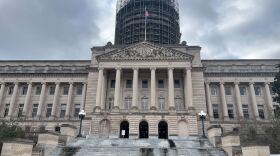Attorney General Daniel Cameron announced his run for governor in a video shot on the steps of the First Lincoln Memorial in Hodgenville, Kentucky. Wearing a crisp blue button-up tucked into a pair of khaki slacks, he quoted Abraham Lincoln:
“I fully appreciate the present peril the country is in and the weight of the responsibility on me.”
His campaign website describes him as a conservative leader, devoted husband and proud father. He’s the first Black person to be elected attorney general and the second to hold statewide office in Kentucky.
Cameron entered the race for governor last May, and received former President Donald Trump’s endorsement in June. As of late January, he led the crowded field of Republican candidates for governor in a Mason Dixon poll.
Cameron’s office declined four interview requests for this story so there was no opportunity to ask him precisely what perils lie before the country, but his record is clear.
As attorney general, Cameron has gone to court to uphold the state’s abortion bans, discouraged FedEx from tracking firearm sales and fought against mask mandates at the height of the COVID-19 pandemic.
Cameron gained national notoriety overseeing the Breonna Taylor case, in which Louisville Metro Police shot and killed Taylor during a nighttime raid in March of 2020. Although the U.S. Department of Justice has since charged all four officers with crimes related to her death, Cameron declined to charge officers for the fatal shooting,
But Cameron is ignoring one present peril the country and world are facing: climate change.
The floods, tornadoes and droughts that have hit the last few years are the kinds of extreme weather events climate scientists say are happening more frequently as the world warms.
Despite the scientific imperative to act on climate change, Cameron has spent his term as attorney general undermining efforts to adapt and ward off further warming in Kentucky and across the country.
Warming has doubled in Cameron’s lifetime
The basic science behind the greenhouse gas effect has been known for more than a century. The combustion of fossil fuels to make electricity, power planes and cars, heat homes and cook food releases heat-trapping gases into the atmosphere.
When Cameron was two years old, NASA scientist James Hansen testified to Congress the agency was 99% certain humankind’s pollution was warming the atmosphere. That was 1988.
The latest report from the world’s foremost body on climate science says the evidence of human-induced climate change is unequivocal. That report from the United Nations Intergovernmental Panel on Climate Change, or IPCC, was authored by 270 scientists from 67 countries. It also confirmed that urgent action is required to preserve the habitability of the planet.
Kentucky is already feeling the impacts. In the last two years, tornadoes tore apart homes in western Kentucky and flooding filled people’s living rooms with mud, mold and debris. In both cases, climate change likely played a role; shifting tornado alley north and east into western Kentucky, and supercharging the water cycle over the Appalachian mountains.
These extreme weather events are part of a larger trend facing the state.
From 1982 until 2002, Kentucky experienced at least 23 large natural disasters costing the state a combined estimated total of between $5 and $10 billion, according to the data from the National Oceanic and Atmospheric Administration.
From 2003 until 2022, the number more than doubled. Kentucky experienced 54 large natural disasters costing the state a combined estimated total of between $10 and $20 billion. These costs cover the physical damages, businesses losses and repairs to roads and bridges.

While Kentuckians have been repairing their homes, Cameron has been fighting to undermine policies that would limit warming and help the planet adapt to climate change.
Fighting climate initiatives
Cameron’s not the only candidate for governor who has eschewed or ignored the science and implications of climate change. While serving as the U.S. Ambassador to Canada, Kelly Craft said she believes “both sides” of climate science. In fact, none of the leading candidates for governor, including incumbent Democratic Gov. Andy Beshear, mention climate change among their priorities on their campaign websites.
But Cameron is in a unique position as attorney general, and has used his position to repeatedly undermine state, federal and corporate policies fighting climate change.
Ahead of the U.S. Supreme Court decision that limited the U.S. Environmental Protection Agency’s authority to regulate greenhouse gas emissions, Cameron was among those who filed a brief siding with conservative Supreme Court justices.
“Allowing the EPA to restructure our nation’s entire energy sector to address climate change unfairly places a target on the Kentucky coal industry,” Cameron wrote.
At the federal level, Cameron has often worked with Republican attorneys general around the country to oppose:
- An EPA proposal that would reduce smog and curb greenhouse gas emissions
- A U.S. Department of Transportation rule to reduce on-road carbon emissions to net-zero by 2050
- Environmental groups' efforts to block the largest offshore oil and gas lease sale in U.S. history
- President Joe Biden’s executive order that shut down the Keystone XL Pipeline
- A Federal Acquisition Regulatory Council rule requiring certain federal contractors to disclose their greenhouse gas emissions and reduce them
Kentucky’s role in a renewable future
The latest consensus from the IPCC is that the world must work to limit warming to around 2.7 degrees in order to preserve the habitability of the planet. To do that, climate scientists say greenhouse gas emissions need to drop by half by 2030 with the planet reaching net zero by 2050.
Perhaps the clearest view of Cameron’s views on the transition from fossil fuels to renewable energy is laid out in comments to Kentucky utility regulators regarding the future of the state’s largest utility, Louisville Gas and Electric and Kentucky Utilities.
The attorney general’s office told utility regulators last year that LG&E and KU should employ an “all of the above energy strategy” similar to Beshear’s current plan. However the office also discouraged utility regulators from considering LG&E and its parent company’s plans to reach carbon neutrality by 2050.
“The net-zero emissions policy of the Companies’ corporate parent entity, PPL, is entirely irrelevant to this generation planning process,” Attorney J. Michael West wrote on behalf of Cameron’s office. “The Commission should afford no consideration to the Companies’ corporate net-zero emissions goals in the generation planning process or in any other proceeding.”
ESG investing
In February, Cameron pledged to keep “politics out of Kentucky’s pensions” and fight back against large investors embracing socially responsible investing practices.
“I'm signing this pledge to stop radical leftists from destroying our energy industry,” Cameron said in the campaign press release.
He said environmental, social, governance, or ESG, investment strategies violate Kentucky state law that discourages state agencies from doing business with financial companies divesting from fossil fuels.
He told conservative radio host Glenn Beck last summer the sole duty of a financial company is to make money for its beneficiaries, and that ESG strategies could negatively impact state retirement funds.
“I’ve talked to a lot of fossil fuels, natural gas, and coal companies that say on the open markets it’s hard for them to find financing,” he said. “And it’s because these index funds, or these asset managers, are using other peoples’ money.”
ESG standards are another way for investment management firms like BlackRock to evaluate the future financial performance of companies and industries they want to invest in.
While they are considered non-financial indicators, the U.S. Department of Labor and the Financial Stability Oversight Council have issued reports and rules recognizing the role ESG considerations play in the future of financial markets.
In October, Cameron launched a multi-state investigation into six major banks over ESG investment practices. He used an anti-ESG law passed last year to justify issuing subpoenas to Bank of America, Citigroup, Goldman Sachs, JP Morgan Chase, Morgan Stanley, and Wells Fargo.
Within weeks the Kentucky Bankers Association sued Cameron arguing he had acted in excess of his legal authority and had infringed on First Amendment rights.
Jordan Haedtler, a financial policy consultant with the climate think tank Sunrise Project, said the bankers association directly pointed to the relief funds they helped raise for the flooding in Eastern Kentucky and the Tornadoes in Western Kentucky.
“And said that many of those risks were exacerbated by climate change. They had had to do a lot of lending to support relief to those communities and it just didn’t make sense to compel them to ignore risks like that,” Haedtler said.
Anti-ESG legislation has been passed in at least nine states. One study by Sunrise Project and Econsult Solutions Inc. used similar legislation in Texas to forecast how Kentucky’s bond markets would be impacted and found it could cost taxpayers tens of million dollars.
“We estimate that in the next 12 months this is going to cost Kentucky communities as much as $70 million dollars in just the first year this law is in effect,” he said.
Haedtler says the reality is climate change presents enormous risks to investors, lenders, owners, employees and anyone else with a stake in the financial system. That’s not to mention the physical risks to homes and livelihoods.
One might call it peril.
Opportunities for change
Kentucky has done among the least of any state in the country at tackling climate change compared to other conservative states, said Joshua Basseches, assistant professor of public policy and environmental studies at Tulane University.
Louisiana, for example, has a greenhouse gas reductions plan while Kentucky does not. Texas has a huge and growing portfolio of renewable energy even as it continues to produce fossil fuels.
“Kentucky is a true outlier in terms of how far behind it is,” Basseches said. “ The state economy as a whole will lose out if there is foot-dragging by state policy makers.”
Regardless of politics, Basseches sees evidence that the economic transition is coming to Kentucky.
The state’s coal plants are aging, and increasingly outcompeted by renewables. One recent study found it’s now cheaper to build local solar farms than to continue operating Kentucky’s remaining coal-fired power plants.
Batteries for the next generation of Ford and Lincoln electric vehicles will be made at a nearly $6 billion park now under construction near Elizabethtown. Gov. Andy Beshear calls it the “biggest economic development project” Kentucky has ever seen.
The federal Inflation Reduction Act, passed last year, offers a number of tax incentives for electric vehicles, clean hydrogen and renewable energy, but it’s in part up to the state’s elected officials to take advantage of what’s available.
Basseches said Kentucky would be best served by a governor who acknowledges the realities of climate change.
“Overall economic well being of the state as well as the propensity for experiencing natural disasters, by those two metrics, the state would be much better served by someone who is actively working to mitigate climate change through policy,” Basseches said.






